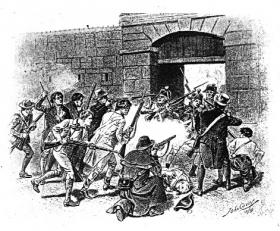Revd William Martin and the Reformed Presbyterian Church
Published in 18th–19th - Century History, Issue 4 (Jul/Aug 2008), News, Volume 16
Hearts of Steel storming the barracks at Belfast in December 1770. Martin encouraged his congregation to escape their suffering under landlord rule and accompany him to South Carolina. (Linen Hall Library)
Born in Ballykelly, Co. Derry, in 1729, William Martin was remarkable for being the first Irish-born minister of the Reformed Presbyterian Church, which had been introduced by Scottish settlers in the 1660s. In 1760 he became the minister of Kellswater, Co. Antrim, the oldest congregation in the Irish synod. This was a time of economic hardship in Ulster, made worse by demands for higher rents on the earl of Donegall’s estates. The consequent evictions provoked an insurrection by a secret society, the Hearts of Steel (see HI 7.4, Winter 1999), which saw widespread disturbances across Ulster. Armed gangs roamed parts of the province, and the assaults on middlemen, the mutilation of cattle and arson attacks caused concern at the highest levels of government. The military were called in and a number of Steelboys were executed. The troubles reached their height in 1772 and affected many of Revd Martin’s congregation.
Speaking from the pulpit in 1772, Martin encouraged his congregation to escape their suffering under landlord rule and accompany him to South Carolina. At that time anyone emigrating was entitled to a £4 bounty. Four hundred and sixty-seven families of different religious denominations, about 1,000 individuals, sailed to Charleston, South Carolina. Although the ships arrived safely, an outbreak of smallpox on board had claimed some lives and the survivors were put in quarantine before being allowed to disembark.
The north Antrim families were given land in the interior, which they cleared and settled to begin farming. Initially Revd Martin was minister in a church at Rocky Mountain Road in Chester that was called a ‘Catholic church’ at the time because it was interdenominational. Martin had always encouraged religious tolerance at home and continued to do so in America. By 1794 he had his own Reformed Presbyterian congregation in a church they had built for themselves.
Because of his experiences in Ireland, Martin opposed colonial rule and fought against the British in the American War of Independence. He died in October 1806 at the age of 77 after falling from a horse and was buried near his home.
There are 2,500 Reformed Presbyterians—often known as Covenanters—in Ireland today, made up of 37 congregations across the island. The church is also strong in America, particularly in South Carolina, where Reformed Presbyterians still honour the memory of Revd William Martin, not just for his work as a churchman but also for being a patriot.
















